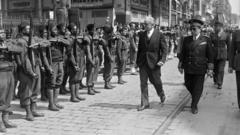The long-standing tensions between France and Senegal have taken a notable turn as French President Emmanuel Macron officially recognized a historical massacre that occurred almost 80 years ago involving Senegalese soldiers returning from World War II. This acknowledgment reflects an evolving narrative of colonial history and its lingering effects. The incident originated in December 1944 when returning soldiers from the Tirailleurs Senegalais unit, frustrated over unfair pay discrepancies, protested in the Thiaroye military camp, near Dakar, which was met with excessive violence by French authorities.
Originally, the official death toll was recorded at 35; however, some historians estimate that the number may have reached as high as 400 as a result of the brutal crackdown. President Macron's letter to Senegalese President Bassirou Diomaye Faye describes the events as a "massacre," marking a significant shift in France's narrative regarding its colonial past. In light of this, Faye expressed hope that this acknowledgment could facilitate a deeper exploration of the painful events at Thiaroye.
As Senegal approaches the 80th anniversary of these tragic events, Faye has indicated that he may seek a formal apology from France and emphasized that the continued military presence of France in Senegal undermines the country’s sovereignty. He reiterated the importance of Senegal maintaining independence and questioned the need for foreign military bases in a self-governing nation.
The historical legacy of the Tirailleurs Senegalais is complex, with soldiers recruited not only from Senegal but from various regions across France’s former African colonies, igniting a broader dialogue concerning reparative justice and historical accountability between France and its former territories.
Originally, the official death toll was recorded at 35; however, some historians estimate that the number may have reached as high as 400 as a result of the brutal crackdown. President Macron's letter to Senegalese President Bassirou Diomaye Faye describes the events as a "massacre," marking a significant shift in France's narrative regarding its colonial past. In light of this, Faye expressed hope that this acknowledgment could facilitate a deeper exploration of the painful events at Thiaroye.
As Senegal approaches the 80th anniversary of these tragic events, Faye has indicated that he may seek a formal apology from France and emphasized that the continued military presence of France in Senegal undermines the country’s sovereignty. He reiterated the importance of Senegal maintaining independence and questioned the need for foreign military bases in a self-governing nation.
The historical legacy of the Tirailleurs Senegalais is complex, with soldiers recruited not only from Senegal but from various regions across France’s former African colonies, igniting a broader dialogue concerning reparative justice and historical accountability between France and its former territories.




















